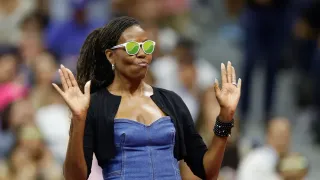
6 hours ago
Ruby Rose Calls Out Sydney Sweeney Over Queer Representation
READ TIME: 3 MIN.
Hollywood’s relationship with LGBTQ+ representation is a long, winding saga—sometimes triumphant, often controversial, and never dull. The latest headline-making flashpoint? Ruby Rose, actor and out queer icon, didn’t mince words this week when she clapped back at Euphoria and Anyone But You star Sydney Sweeney over her casting in the upcoming film Christy, where Sweeney plays a lesbian character. “Cretin,” Rose posted on social media, before going on to suggest Sweeney “hates gay people” .
The drama unfolded after it was announced that Sweeney would star in Christy, a forthcoming drama centering on a same-sex romance. Ruby Rose, herself no stranger to playing queer characters (remember Batwoman?), took to Instagram Stories to air her grievances—delivering a fiery critique that instantly divided fans and industry voices alike. “She hates gay people,” Rose wrote, adding, “I cannot with this cretin.” The post was swiftly deleted but not before screenshots made their way across social platforms .
Rose’s accusations refer to persistent online rumors and social media discourse suggesting Sweeney, who has never publicly identified as queer, holds conservative views or harbors anti-LGBTQ+ sentiments—claims Sweeney and her representatives have repeatedly denied. To date, there is no verified evidence supporting Rose’s assertion that Sweeney “hates” gay people .
This isn’t just a celebrity spat—it’s a flashpoint in a much larger conversation about who gets to tell queer stories and who is invited to participate in LGBTQ+ visibility in pop culture. For years, the LGBTQ+ community has pushed back against the so-called “straight-washing” of queer roles, where heterosexual actors are cast in LGBTQ+ parts, often at the expense of out and openly queer talent .
Ruby Rose’s outburst taps into a very real frustration: authentic representation matters. For queer people, seeing themselves reflected on screen—accurately, sensitively, and with lived experience—can be life-changing. There’s also the economic reality: queer roles often represent some of the few opportunities for LGBTQ+ actors to break through in a notoriously heteronormative industry .
But this moment also exposes the pitfalls of social media call-outs. Without substantiated evidence, accusations risk muddying legitimate debates about representation with personal animus. As one entertainment columnist put it, “The stakes are too high for the queer community to waste energy on infighting when there’s still so much ground to cover in Hollywood’s slow march toward equality” .
As of this writing, Sydney Sweeney has not addressed Rose’s comments directly. Her team has previously pushed back against suggestions she harbors anti-LGBTQ+ beliefs, noting her support of queer co-stars and inclusion efforts on set . With her career on a meteoric rise, Sweeney is no stranger to controversy—yet this is the first time her casting in a queer role has prompted such forceful pushback from within the LGBTQ+ community itself.
On social media, reactions have been as divided as the community itself. Some users praised Rose’s candor, arguing that queer actors should be prioritized for queer roles and that public accountability is necessary. Others accused Rose of “gatekeeping” and questioned the wisdom of policing identities or beliefs based on rumor rather than fact .
Ultimately, the Rose-Sweeney dustup is emblematic of where Hollywood—and queer audiences—find themselves in 2024: awash in both progress and painful growing pains. The industry has undoubtedly made strides; LGBTQ+ characters now appear in more films and series than ever before, and openly queer actors are increasingly landing major roles. Still, the question of authenticity and meaningful inclusion persists.
Casting a non-queer actor in a queer role is not, in itself, an act of erasure or disrespect. But in an environment where openly LGBTQ+ actors are still underrepresented—and often pigeonholed or sidelined—the optics matter. As Ruby Rose’s critique makes clear, many in the community want both visibility and opportunity, not just one or the other .
If there’s a lesson here, it’s that the fight for LGBTQ+ representation isn’t just about who’s on screen, but about who gets to shape the narrative. It’s about more queer writers, directors, and producers making the calls, and about a culture where queer actors are not only allowed but encouraged to play queer and straight roles alike.
For now, the Rose-Sweeney debate is a reminder: Representation is powerful, but so is compassion. The queer community deserves stories told with care and integrity—and a Hollywood that doesn’t pit its voices against one another, but lifts them up, together.






